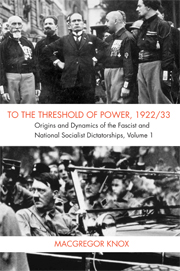 To the Threshold of Power, 1922/33
To the Threshold of Power, 1922/33 Book contents
- Frontmatter
- Contents
- List of Figures and Maps
- Preface
- Abbreviations
- Introduction: Dictatorship in the Age of Mass Politics
- PART I THE LONG NINETEENTH CENTURY, 1789–1914
- PART II FROM WAR TO DICTATORSHIP, 1914–1933
- 3 The Synthesis of Violence and Politics, 1914–1918
- 4 Kampfzeit: The Road to Radical Nationalist Victory, 1918–1933
- Conclusion: Into the Radical National Future: Inheritances and Prospects of the New Regimes
- Frequently Cited Works
- Index
4 - Kampfzeit: The Road to Radical Nationalist Victory, 1918–1933
Published online by Cambridge University Press: 05 June 2012
- Frontmatter
- Contents
- List of Figures and Maps
- Preface
- Abbreviations
- Introduction: Dictatorship in the Age of Mass Politics
- PART I THE LONG NINETEENTH CENTURY, 1789–1914
- PART II FROM WAR TO DICTATORSHIP, 1914–1933
- 3 The Synthesis of Violence and Politics, 1914–1918
- 4 Kampfzeit: The Road to Radical Nationalist Victory, 1918–1933
- Conclusion: Into the Radical National Future: Inheritances and Prospects of the New Regimes
- Frequently Cited Works
- Index
Summary
The Great War did not make nationalist dictatorship inevitable in Italy or Germany. It made it possible, within a range of outcomes stretching from parliamentary social democracy to military or nationalist dictatorship. Neither society, as 1918 ended, could regain the lost stability of 1914 without radically reshuffling its institutional arrangements and its distribution of political and social power. War – and in Germany revolution – had unleashed immense collective and individual expectations that neither system proved capable of containing. One possible governing formula, Lenin's “scientific concept of dictatorship” – “completely unlimited power, restrained by no laws or rules whatsoever,…relying directly on violence” – wielded by admirers of the Bolsheviks, loomed as an apparent threat in both countries. A second, the democratic renewal of either or both polities and the final achievement of national integration through peaceful transformation appeared possible in 1919, and has enjoyed a wide and hopeful following among German historians ever since. Yet in 1919 and after, a Bolshevik Revolution – consequence and reward of Russia's backwardness – was not even remotely within the political repertoire of Italy, of Germany, or of any Western society. And against democratic transformation in both Rome and Berlin stood all three extremes: the remains of the old order, the “light from the East” of Marxist utopianism, and the radical nationalism that had grown fat upon the war it had sought and found. The political forces and alignments of 1914–45 were taking leave of the naive left-right spectrum bequeathed by the French Revolution.
- Type
- Chapter
- Information
- To the Threshold of Power, 1922/33Origins and Dynamics of the Fascist and National Socialist Dictatorships, pp. 232 - 398Publisher: Cambridge University PressPrint publication year: 2007


